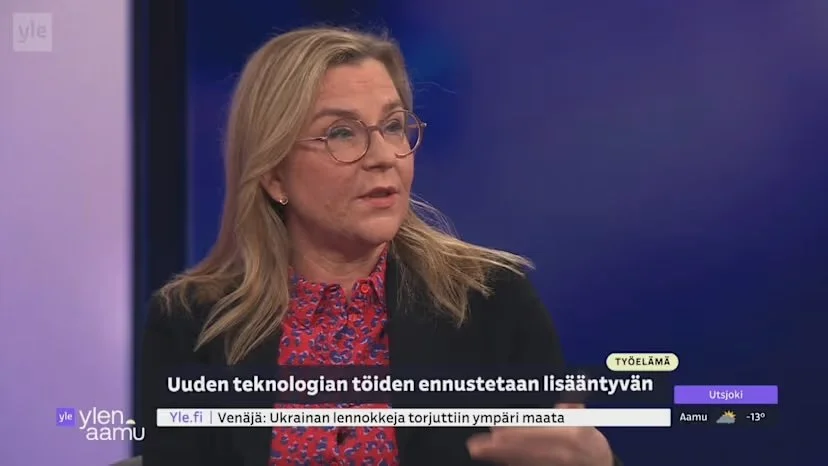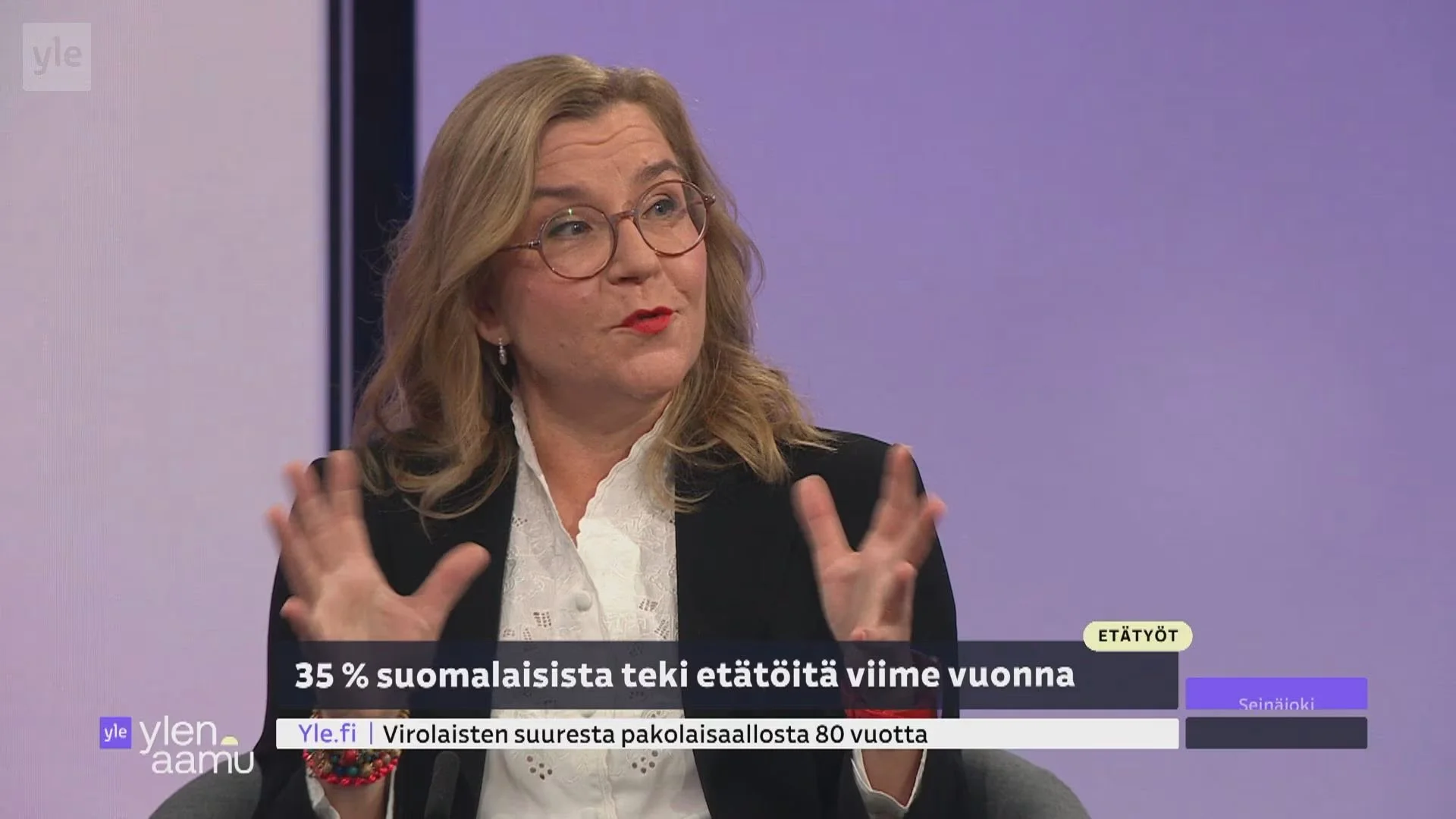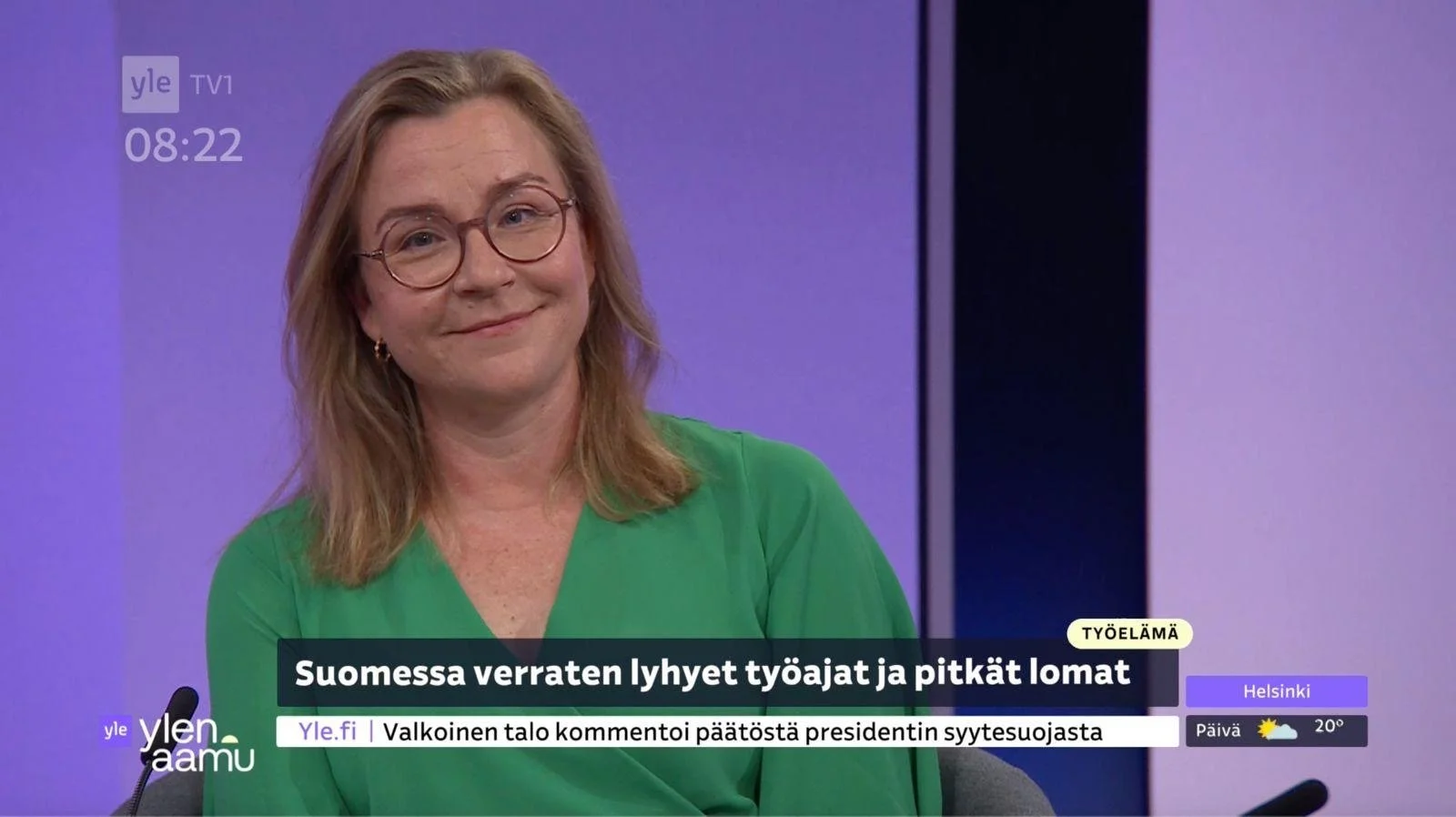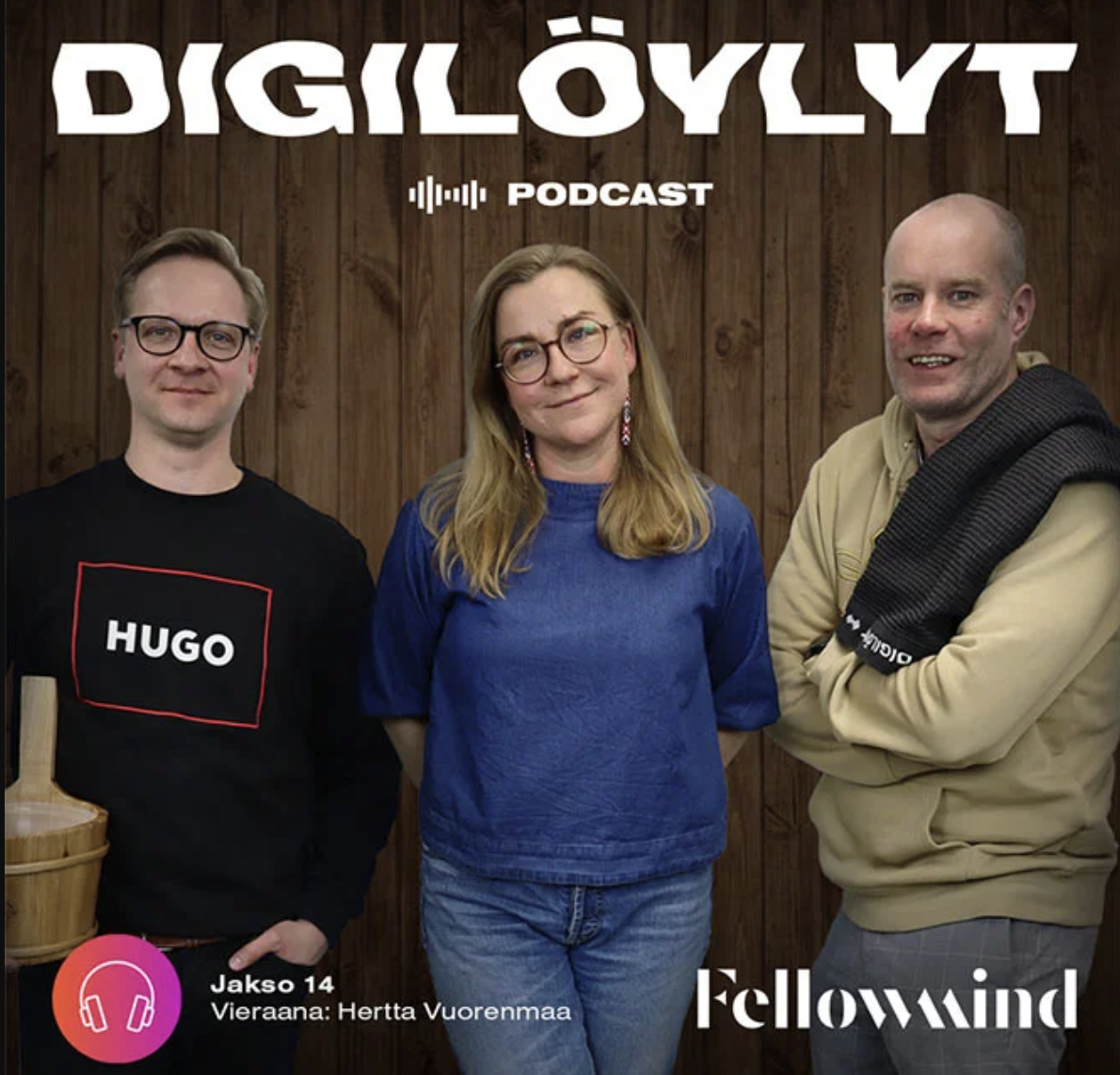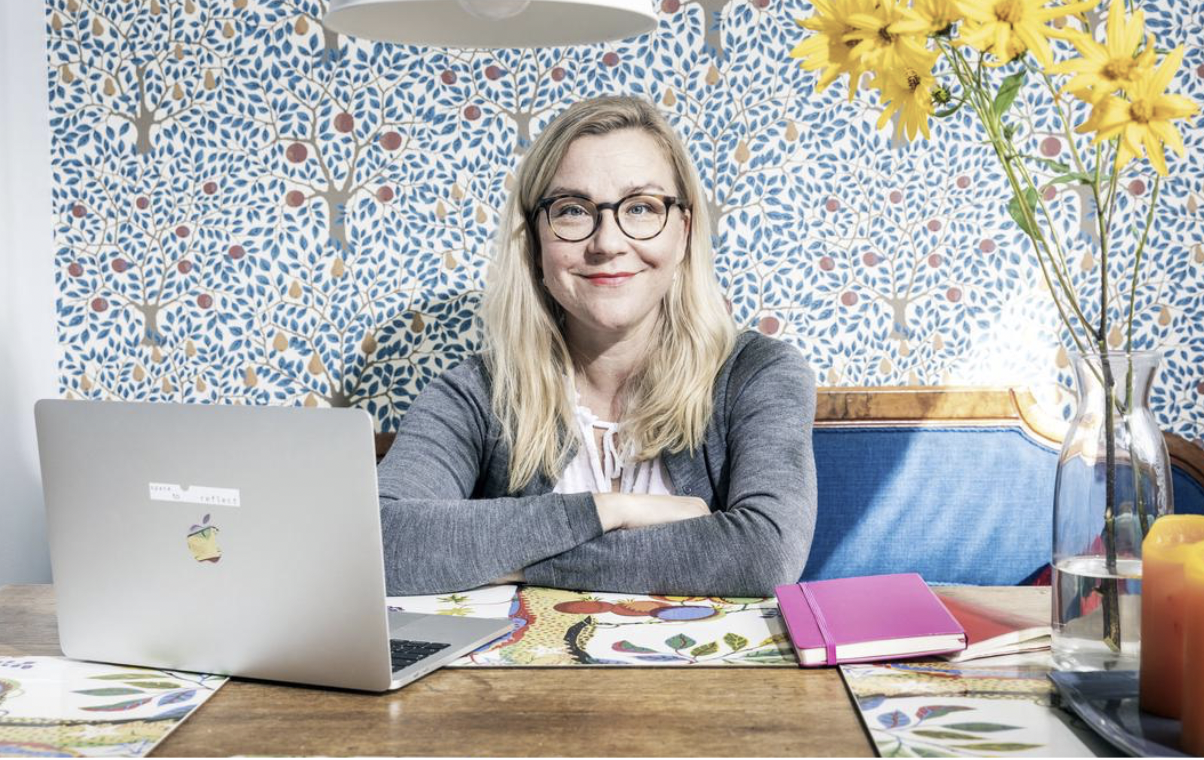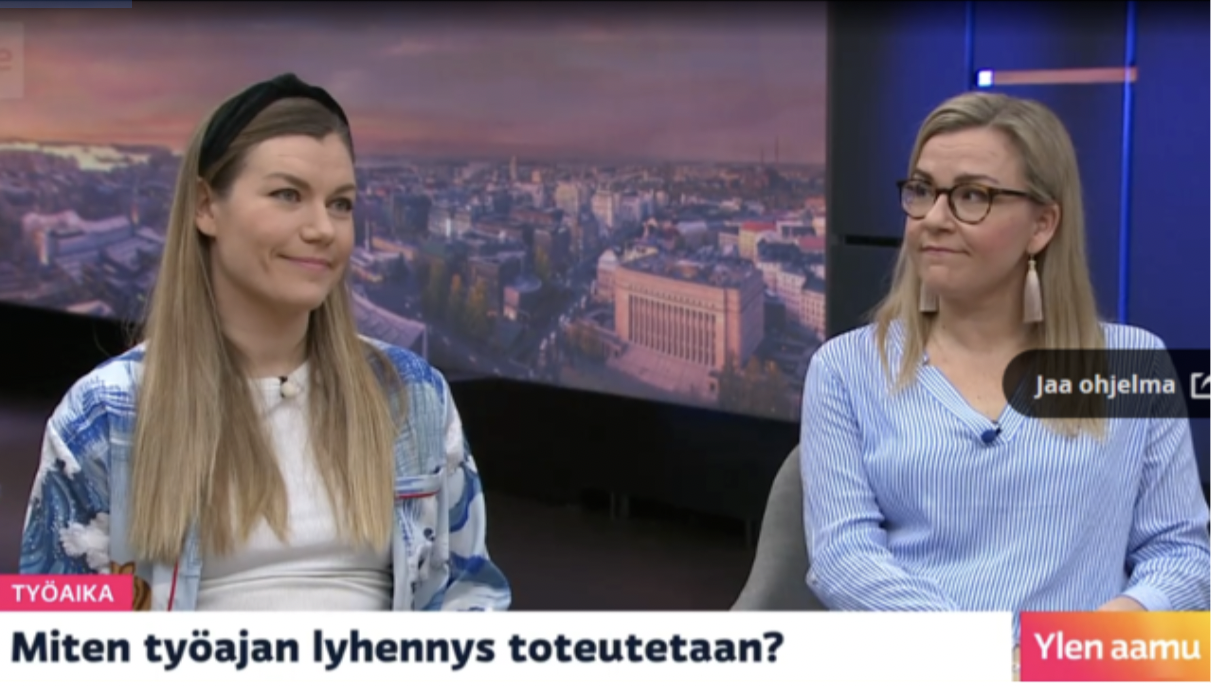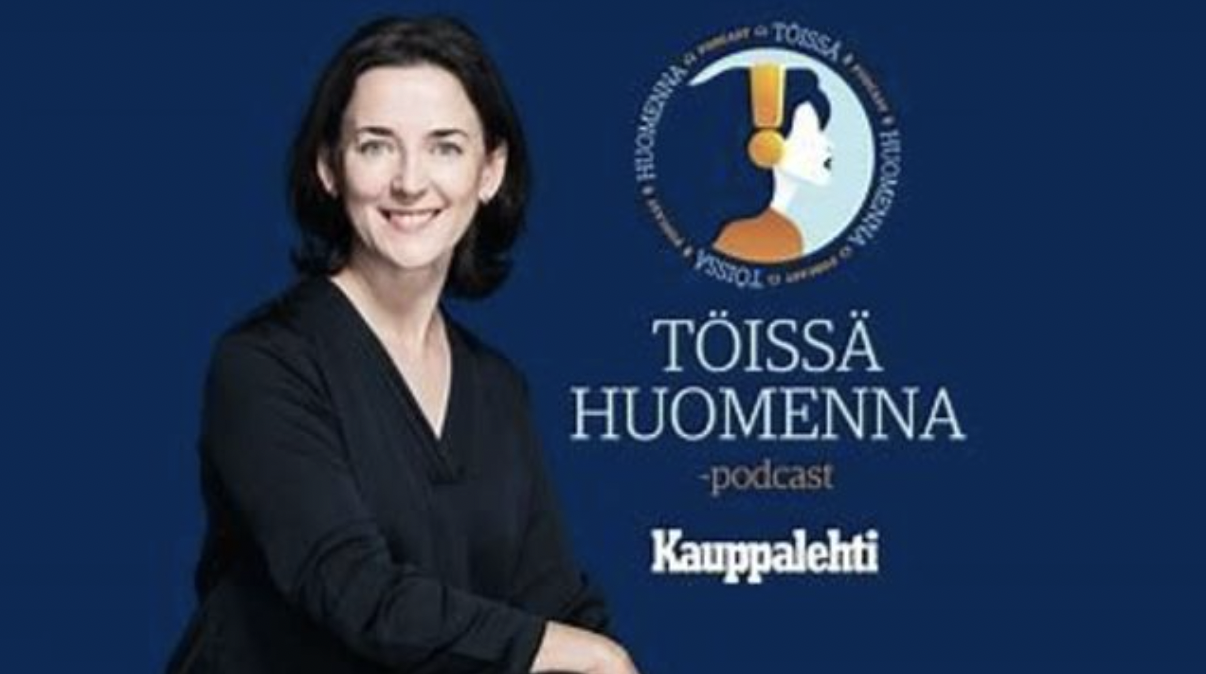Media
For all inquiries, please contact
hertta.vuorenmaa@aalto.fi
Back to Work
Back to Work YouTube discussions with various guests
-
In this episode, Pastor and journalist Hilkka Olkinuora is interviewed by Research Director at Aalto University Future of Work Hertta Vuorenmaa about Values, appraisal and appreciation. Hilkka warm-heartedly opens up about how we can deal with shame and guilt at work and get rid of the imposter syndrome once and for all.
-
Professor and philosopher Esa Saarinen is the guest in the second episode of Aalto University's Back to Work Sessions interview series. The theme is changing work and how to create a more sustainable future of work. Esa deals with this from a philosophical perspective, such as thinking about thinking, thinking about the individual and the community, and group flourishing. The interview was moderated by Hertta Vuorenmaa, research director of Aalto University's Future of Work project.
-
In this episode, Adjunct Professor of Neurology, Brain Researcher Kiti Müller is interviewed by Research Director at Aalto University Future of Work Hertta Vuorenmaa about the changing nature of work from a neurological perspective. Kiti gives us insights into how our brains have been affected by the isolation during the pandemic and the balance between automation and human interaction in the future working landscape.
-
Jari Hakanen is a research professor at the Institute of Occupational Health (TTL). For more than 20 years, Jari Hakanen has studied Finnish working life from the perspective of well-being at work: good leadership and proactive adjustment of one's own work, reconciliation of work and other life, as well as mental health and ability to work. He has also been developing and implementing many development projects on the mentioned themes.
Features in press, webinars & podcasts:
Helsingin Sanomat: Outi Sivonen on pomo, joka pitää perjantait vapaana ja kauhistuu ajatuksesta täyteen työviikkoon palaamisesta. Tutkija uskoo, että työelämän seuraava murros on nelipäiväinen viikko täydellä palkalla.
YLE: Suomalaisyritys siirtyy kuuden tunnin työpäivään - "Uskomme, että pystymme tekemään tässä ajassa 7,5 tunnin työt"
Helsingin Sanomat: Työporukassa on usein se yksi tyyppi, joka valittaa epäkohdista ja vastustaa uudistuksia. Vastarannan kiiski saa helposti hankalan tyypin maineen, vaikka vastaanhangoittelu voi olla kaikkien etu.
Helsingin Sanomat: Monet yritykset etsivät rekrytoidessaan ”kulttuurista yhteensopivuutta” – mutta onko se hyvä asia?…
Helsingin Sanomat: Epävakaa maailmantilanne ravistelee myös työelämää. Asiantuntijat kertovat, millaisia taitoja työntekijöiltä nyt odotetaan ja millaisessa murroksessa työelämä on.
Digilöylyt: Työn neljäs vallankumous on täällä
Työ nyt ja tulevaisuudessa: Eväitä ajatteluun -luentosarja ja podcast
Thinking and learning are an important part of today's work, and now there is a great opportunity for joint thinking about the future of work and working life. Aalto University's Future of Work, The Finnish Association of Work Life Research (FAWORE) and the WORK2030 program invite you to open working life researcher meetings at the Otaniemi campus starting in November.
In the lecture series, Finland's leading working life researchers will present their new and slightly older research findings on changes in work and working life. The lectures are intended for everyone who is thinking in their own work about what the change of their own work and, more broadly, work and the related opportunities look like and how they should be approached as sustainably as possible.
Seen in media
#14: Ajattele! Työn neljäs vallankumous on täällä – lauteilla Hertta Vuorenmaa, Aalto-yliopisto
Miten työn neljäs vallankumous muuttaa tietotyötä? Mitä alansa trendikkäät edelläkävijäjohtajat ja huippuasiantuntijat tekevät tässä ajassa? Mitä jokaisen tietotyöläisen pitäisi ymmärtää työstä nyt? Miten tuottavuutta pitäisi mitata nykyisin ja miten työntekijää pitäisi johtaa kestävästi? Kumpi on kalliimpaa yritykselle työhyvinvoinnista huolehtiminen vai burn out -kulttuuri? listen here
Jos töitä ei riitä kaikille, miten käy yhteiskunnan vakauden?
”Psykologinen turvallisuus ei toteudu, jos humps vaan sata ihmistä saa potkut”
Ylen aamu: Miten työpäivän lyhennys käytännössä onnistuu?
Aamu-tv:n vieraana kuudentunnin työpäivään siirtyvän Vapa Median perustaja Iida Hakola sekä tulevaisuuden työn tutkija Hertta Vuorenmaa.
We are living exceptional times: How will the future unfold?
(SK 28.05.2019)
Read here!
What is our strategy, really?
Using data and AI to see how strategic decisions are diffused in the company.
Työttömien määrä kasvanut – "Ei tilanne ihan synkältä näytä"
Maailman talousfoorumi julkaisi tällä viikolla ennusteen siitä, mitkä työpaikat katoavat ja mitkä lisääntyvät seuraavan viiden vuoden aikana maailmanlaajuisesti. Millaisen työn murroksen äärellä elämme ja millainen rooli tekoälyllä on työelämässä tulevaisuudessa? Vieraina ovat alivaltiosihteeri Elina Pylkkänen työ- ja elinkeinoministeriöstä sekä tutkimusjohtaja Hertta Vuorenmaa Aalto-yliopistosta.
Etä- ja lähityön tasapainoa haetaan Suomessa
Etätyö on tapa organisoida työtä ja se on pandemian jälkeen ollut hyvin yleistä Suomessa. Kokopäiväisestä etätyöstä on siirrytty hybridiin, jossa välillä ollaan toimistolla ja välillä kotona. Nyt hybridimallille haetaan Suomessa tasapainoa. Työhyvinvointi ei ole palautunut pandemiaa edeltävälle tasolle. Koska sitä täytyy kehittää, oli työskentelytapa mitä tahansa, mitä pitäisi tehdä? Keskustelemassa Aalto-yliopiston tutkimusjohtaja Hertta Vuorenmaa ja Työterveyslaitoksen pääjohtaja Antti Koivula.
Toimisiko kuusipäiväinen työviikko myös Suomessa?
Etätyö on tapa organisoida työtä ja se on pandemian jälkeen ollut hyvin yleistä Suomessa. Kokopäiväisestä etätyöstä on siirrytty hybridiin, jossa välillä ollaan toimistolla ja välillä kotona. Nyt hybridimallille haetaan Suomessa tasapainoa. Työhyvinvointi ei ole palautunut pandemiaa edeltävälle tasolle. Koska sitä täytyy kehittää, oli työskentelytapa mitä tahansa, mitä pitäisi tehdä? Keskustelemassa Aalto-yliopiston tutkimusjohtaja Hertta Vuorenmaa ja Työterveyslaitoksen pääjohtaja Antti Koivula.
The Mystery of the Missing Millennial Manager: How Millennials Are Different at Work
The new problem is this: for many organizations, millennials are proving increasingly hard to retain.
Johtamisen paradoksi ei jätä Juha Äkrästä rauhaan – Miksi huonovointisuus kasvaa, vaikka työelämä muuttuu yhä kiinnostavammaksi?
Juha Äkräs and Hertta Vuorenmaa visited Kauppalehti-podcast discussing themes around
changing work and leadership. Paradoxically, fewer people are committed to their job while the work-life gets richer and more interesting. Why is this? Juha speaks of this paradox, listen here
On the other hand, the COVID-19 time has been test laboratory for changing way of where and when we work. Hertta Vuorenmaa is certain that there is no return to time when we spent 8 hours at office and called it a workday. As work changes, building sustainable work-life is not up only to individuals - we need societal, organisational and individual reflection in which kind of work-life we want to be in the future. To listen the podcast, click here

